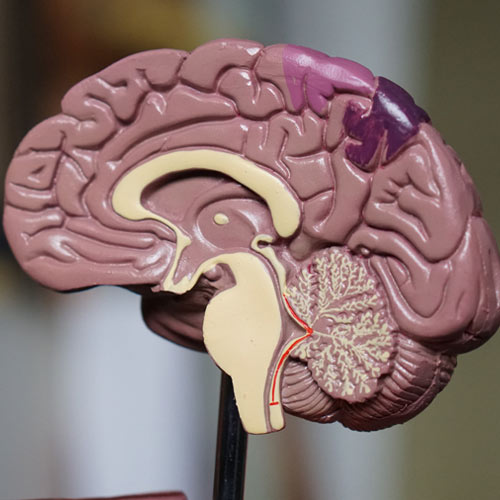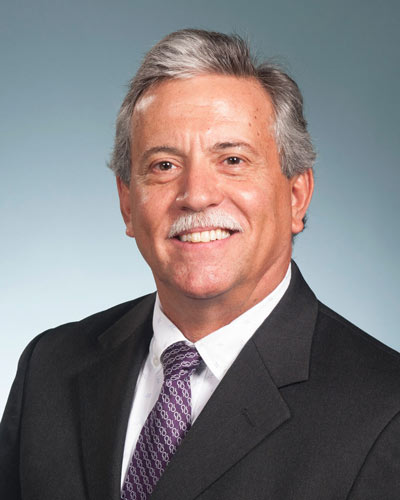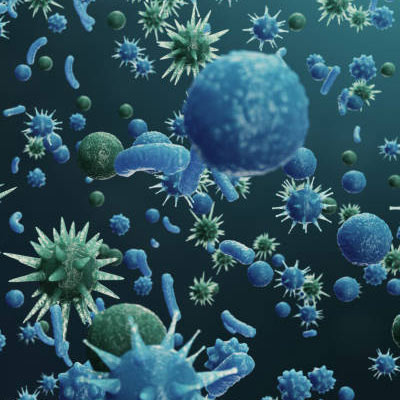Research Group Calls for Consensus, Collaboration to Improve Understanding of how
Infections Drive Alzheimer’s
June 7, 2023 A research consortium, including a Philadelphia College of Osteopathic Medicine neuroscientist and his research coordinator, are calling for a consensus on how scientists
identify and evaluate how infections contribute to or cause cognitive impairment and
dementias, including Alzheimer’s disease.
A research consortium, including a Philadelphia College of Osteopathic Medicine neuroscientist and his research coordinator, are calling for a consensus on how scientists
identify and evaluate how infections contribute to or cause cognitive impairment and
dementias, including Alzheimer’s disease.
Writing in Alzheimer’s & Dementia, the journal of the Alzheimer’s Association, the researchers aim to raise awareness “that microbial infection is a known cause
of some types of dementia, and to evaluate the hurdles to be overcome in the development
of rapid and accurate” diagnostics to assess infections in people who have, or are
at risk of developing, Alzheimer’s.
The implication is that, if scientists and clinicians come to agreement on the role
infection plays in Alzheimer’s and develop a standard methodology to evaluate people
with early signs of the disease, patients could—in the future—be set “on an appropriate
antimicrobial therapeutic path with the aim of arresting or reversing disease progression.”
 Brian J. Balin, PhD, a professor of Neuroscience and Neuropathology and director of the Center for Chronic Disorders of Aging at PCOM, and colleagues affiliated with Intracell Research Group outline recent scientific
findings that the signature protein in a brain affected by Alzheimer’s (the Aβ peptide)
plays a notable role in the immune system’s response to pathogens. The authors suggest
that “downstream failure of this immune response or persistent activation from chronic
infection leads to sustained inflammation and neurodegeneration,” as well as cell
death, which leads to Alzheimer’s. The researchers also contend that genetic risk
factors likely involve infection.
Brian J. Balin, PhD, a professor of Neuroscience and Neuropathology and director of the Center for Chronic Disorders of Aging at PCOM, and colleagues affiliated with Intracell Research Group outline recent scientific
findings that the signature protein in a brain affected by Alzheimer’s (the Aβ peptide)
plays a notable role in the immune system’s response to pathogens. The authors suggest
that “downstream failure of this immune response or persistent activation from chronic
infection leads to sustained inflammation and neurodegeneration,” as well as cell
death, which leads to Alzheimer’s. The researchers also contend that genetic risk
factors likely involve infection.
“There’s mounting evidence, including in various patient case reports we highlight
in our paper, of infectious diseases serving as a primary cause of dementia, which
leads us to make this call for consensus,” Balin said. “Taking the steps we propose
could move the assertion that microbes play a causal role in neuroinflammation and
neurodegeneration—as seen in Alzheimer’s—from controversy to consensus.”
Balin and colleagues say there’s urgent need among scientists for:
- interdisciplinary collaboration and consensus,
- testing and validating the best methods to characterize the brain pathobiome, and
- identifying the least-invasive biosamples, collected from living patients, which could
confirm microbial infections
 There are numerous options for biosample collection, so that will be a major task
in itself. The researchers suggest methods ranging from cerebrospinal fluid and blood
draws to nasal brush sampling. From there, protocols would need to be established
to extract nucleic acids from the tissue or fluid in order to analyze them for any
infections.
There are numerous options for biosample collection, so that will be a major task
in itself. The researchers suggest methods ranging from cerebrospinal fluid and blood
draws to nasal brush sampling. From there, protocols would need to be established
to extract nucleic acids from the tissue or fluid in order to analyze them for any
infections.
Through the establishment of a consensus detection protocol, experts would identify
the most representative tissues or samples for the brain microbiome; determine which
extraction method, or combination of methods, is best; and other steps to lead the
scientific community toward the ability to have reproducible lab results.
From there, the researchers suggest a pilot study that would test patients with varying
stages of dementia and Alzheimer’s, using the consensus detection protocol, with the
ultimate goal of treating patients with appropriate antimicrobial medication. To that
end, the researchers are labeling the development of the consensus protocol as the
Alzheimer’s Pathobiome Initiative, which they say would require input and support
from specialists ranging from neuropathologists and neurologists to microbiologists,
molecular biologists, and bioinformatics experts.
“We want scientists globally to interact more and consolidate efforts that standardize
approaches to how we diagnose infections when people have neurocognitive change,”
Balin said. “We want to know what infections exist and, ultimately, seek to develop
better interventions to treat dementias based on infection. This call for consensus
gives the scientific community a clearer roadmap to help get us there.”
Lead authors of “Establishment of a consensus protocol to explore the brain pathobiome
in patients with mild cognitive impairment and Alzheimer’s disease: Research outline
and a call for collaboration,” are Richard Lathe of the University of Edinburgh Medical
School and Nikki Schultek, principal and founder of the Intracell Research Group. Collaborators include Christine Hammond, MS, research coordinator in Balin’s lab.
About Philadelphia College of Osteopathic Medicine
Established in 1899, Philadelphia College of Osteopathic Medicine (PCOM) has trained
thousands of highly competent, caring physicians, health practitioners and behavioral
scientists who practice a “whole person” approach to care—treating people, not just
symptoms. PCOM, a private, not-for-profit accredited institution of higher education,
operates three campuses (PCOM, PCOM Georgia and PCOM South Georgia) and offers doctoral degrees in clinical psychology, educational psychology, osteopathic
medicine, pharmacy, physical therapy, and school psychology. The college also offers
graduate degrees in applied behavior analysis, applied positive psychology, biomedical
sciences, forensic medicine, medical laboratory science, mental health counseling,
physician assistant studies, and school psychology. PCOM students learn the importance
of health promotion, research, education and service to the community. Through its
community-based Healthcare Centers, PCOM provides care to medically underserved populations.
For more information, visit pcom.edu or call 215-871-6100.
Contact Us
For general media inquiries, please contact the Office of Marketing and Communications
at 215-871-6300 or communications@pcom.edu. Visit our media relations page to view contact information for public relations personnel.
Connect with PCOM

 A research consortium, including a
A research consortium, including a 
 There are numerous options for biosample collection, so that will be a major task
in itself. The researchers suggest methods ranging from cerebrospinal fluid and blood
draws to nasal brush sampling. From there, protocols would need to be established
to extract nucleic acids from the tissue or fluid in order to analyze them for any
infections.
There are numerous options for biosample collection, so that will be a major task
in itself. The researchers suggest methods ranging from cerebrospinal fluid and blood
draws to nasal brush sampling. From there, protocols would need to be established
to extract nucleic acids from the tissue or fluid in order to analyze them for any
infections.